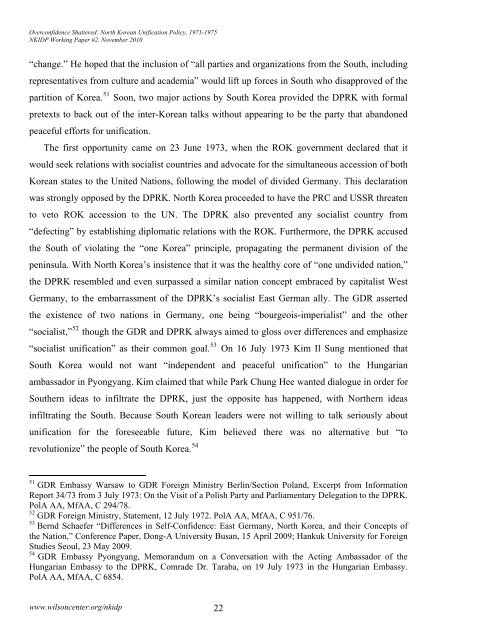Overconfidence Shattered: North Korean Unification Policy, 1971 ...
Overconfidence Shattered: North Korean Unification Policy, 1971 ...
Overconfidence Shattered: North Korean Unification Policy, 1971 ...
- No tags were found...
You also want an ePaper? Increase the reach of your titles
YUMPU automatically turns print PDFs into web optimized ePapers that Google loves.
<strong>Overconfidence</strong> <strong>Shattered</strong>: <strong>North</strong> <strong>Korean</strong> <strong>Unification</strong> <strong>Policy</strong>, <strong>1971</strong>-1975NKIDP Working Paper #2, November 2010“change.” He hoped that the inclusion of “all parties and organizations from the South, includingrepresentatives from culture and academia” would lift up forces in South who disapproved of thepartition of Korea. 51 Soon, two major actions by South Korea provided the DPRK with formalpretexts to back out of the inter-<strong>Korean</strong> talks without appearing to be the party that abandonedpeaceful efforts for unification.The first opportunity came on 23 June 1973, when the ROK government declared that itwould seek relations with socialist countries and advocate for the simultaneous accession of both<strong>Korean</strong> states to the United Nations, following the model of divided Germany. This declarationwas strongly opposed by the DPRK. <strong>North</strong> Korea proceeded to have the PRC and USSR threatento veto ROK accession to the UN. The DPRK also prevented any socialist country from“defecting” by establishing diplomatic relations with the ROK. Furthermore, the DPRK accusedthe South of violating the “one Korea” principle, propagating the permanent division of thepeninsula. With <strong>North</strong> Korea’s insistence that it was the healthy core of “one undivided nation,”the DPRK resembled and even surpassed a similar nation concept embraced by capitalist WestGermany, to the embarrassment of the DPRK’s socialist East German ally. The GDR assertedthe existence of two nations in Germany, one being “bourgeois-imperialist” and the other“socialist,” 52 though the GDR and DPRK always aimed to gloss over differences and emphasize“socialist unification” as their common goal. 53 On 16 July 1973 Kim Il Sung mentioned thatSouth Korea would not want “independent and peaceful unification” to the Hungarianambassador in Pyongyang. Kim claimed that while Park Chung Hee wanted dialogue in order forSouthern ideas to infiltrate the DPRK, just the opposite has happened, with <strong>North</strong>ern ideasinfiltrating the South. Because South <strong>Korean</strong> leaders were not willing to talk seriously aboutunification for the foreseeable future, Kim believed there was no alternative but “torevolutionize” the people of South Korea. 5451 GDR Embassy Warsaw to GDR Foreign Ministry Berlin/Section Poland, Excerpt from InformationReport 34/73 from 3 July 1973: On the Visit of a Polish Party and Parliamentary Delegation to the DPRK.PolA AA, MfAA, C 294/78.52 GDR Foreign Ministry, Statement, 12 July 1972. PolA AA, MfAA, C 951/76.53 Bernd Schaefer “Differences in Self-Confidence: East Germany, <strong>North</strong> Korea, and their Concepts ofthe Nation,” Conference Paper, Dong-A University Busan, 15 April 2009; Hankuk University for ForeignStudies Seoul, 23 May 2009.54 GDR Embassy Pyongyang, Memorandum on a Conversation with the Acting Ambassador of theHungarian Embassy to the DPRK, Comrade Dr. Taraba, on 19 July 1973 in the Hungarian Embassy.PolA AA, MfAA, C 6854.www.wilsoncenter.org/nkidp 22
















